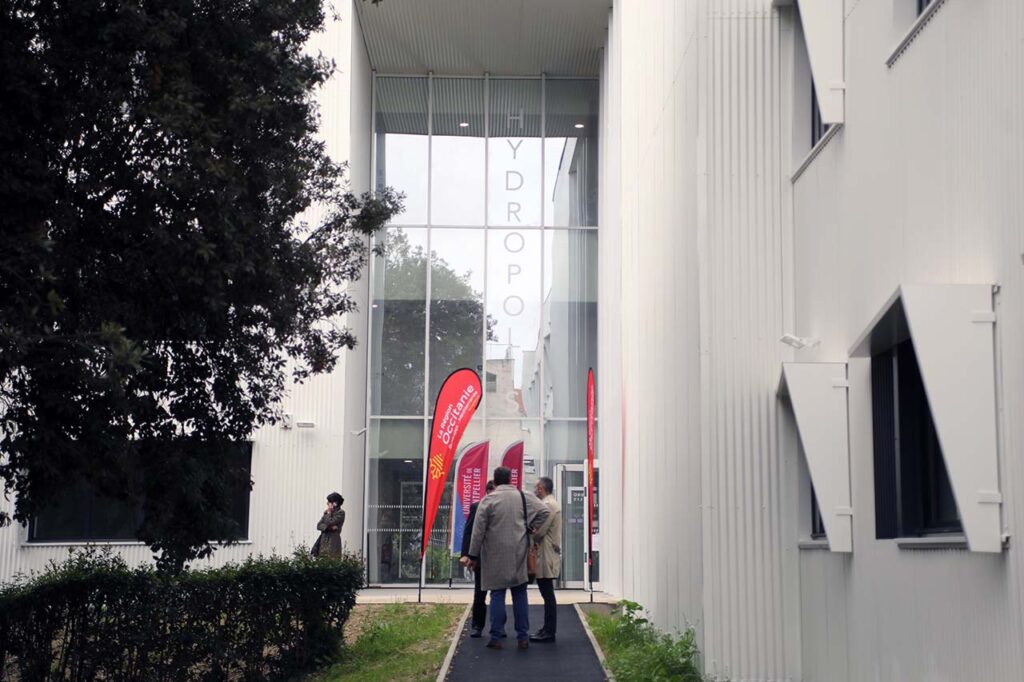With Hydropolis, the water science community comes together
Drought, global warming, irrigation, contamination... The issue of water resources regularly dominates the media spotlight. In Montpellier, the new Hydropolis science park dedicated to water embodies the organized gathering of the water science community to structure the strengths and assets needed to address these challenges.

It was under a symbolic light rain that Hydropolis was inaugurated on March 30. Built on the campus of the Faculty of Pharmacy, the three-story building covers 3,130 m² and represents an investment of €10 million, financed by the European Regional Development Fund, the Occitanie Region, the University of Montpellier, the CNRS, and the IRD. Located in a prime location in the heart of Montpellier, the Hydropolis building surrounds a wooded garden, providing a bucolic retreat for visitors and a botanical resource for students from the Faculty of Pharmacy, who can be seen there engaged in practical work.
This science park dedicated to water is unique in France: "There are currently no other facilities of this kind specifically dedicated to water," explains Éric Servat, director of the UNESCO Icireward International Center. This new water science campus brings together the water research laboratories HydroSciences Montpellier and G-EAU (in the Hydropolis version to be launched on the INRAE campus in Lavalette), as well as the UNESCO ICIREWARD International Center and the Montpellier Environment Research Observatory (OREME) and its high-level analytical geochemistry platform.
Dual purpose
While the Hydropolis building already houses research teams focusing on water resources, contaminants, and health, particularly the chemical and microbiological characterization of water resources, a second building is to be constructed on the Lavalette site with a greater focus on water uses, particularly in agriculture. The site will not only host social scientists working on this issue, but will also draw on existing infrastructure dedicated to agricultural experimentation.
"In total, there are 400 scientists who make up the Montpellier water research community," says the director of the UNESCO International Center Icireward, which is behind this innovative project, "which has always been supported by the University of Montpellier." The project has a dual objective: "Hydropolis brings together the water science community in Montpellier, but it also aims to forge closertiesbetween research teams and the business world." Until now, this has been complicated by the geographical dispersion of the various research forces in the field of water.
Facilitating reconciliation
"The new Hydropolis building has been designed and conceived to facilitate this rapprochement thanks to spaces specifically dedicated to welcoming businesses and fostering interactions with the economic world." Hydropolis will thus strengthen cooperation between manufacturers and research teams in order to facilitate technology transfers, particularly on topics related to water quality and the reuse of treated wastewater.
The building will house the management of the Aqua-Valley Competitiveness Cluster, which has nearly 250 member companies. To accommodate them, there will be dedicated offices as well as large, bright workspaces that will enable companies to collaborate on R&D projects and bring together all the key players in the water sector. "The aim is to cement Montpellier's position in the field of water in the broadest sense, not just in an academic context," emphasizes Eric Servat, who also highlights the importance of water issues in the city's projects.
An important signal
"In this regard, Aqua-Valley's arrival at our premises is highly symbolic, highlighting our desire in Montpellier to address the issue of water on all levels: scientific, economic, but also social and societal." For Éric Servat, the creation of Hydropolis is an important signal that highlights how the water science community in Montpellier is organizing its scientific and technical resources to be able to respond to all types of requests.
Hydropolis enables Montpellier's water community to be "more visible and more attractive," emphasizes Éric Servat, and embodies the importance it has gained in recent years. This is a research topic that is more relevant than ever, and the scientific community gathered within Hydropolis offers "the ability to bring objective elements to the debate in order to make the best possible decisions," insists Éric Servat.